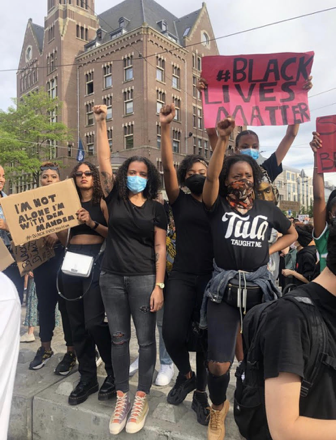Reprinted from Gender & Society
In the summer of 2020 after the murders of Breonna Taylor and George Floyd, protests erupted around the world in solidarity with American Black Lives Matter protesters. Amsterdam was no exception. Protesters also chanted the names of Tomy Holten and Mitch Henriquez, two men of color who were murdered by Dutch police, countering popular Dutch beliefs that racism and police brutality are problems specific to the United States. The Dutch have been criticized for forgetting their colonial past and for refusing to acknowledge race or racial discrimination despite the exclusion of and violence toward Black people in all sectors of society (for more information about this, please see: White Innocence: Paradoxes of Colonialism and Race by Gloria Wekker).
In my recent Gender & Society article, I discuss how Black women navigate this contradiction and how they respond to the Netherland’s culture of color-blindness. I studied a Facebook group called Amsterdam Black Women (ABW). The group was created by five expat Black women and organizes both on- and offline activities. By connecting with women on the basis of race, the group implicitly demonstrates that race matters and does impact the conditions of one’s life despite the color-blind narrative of the white mainstream. Through events and activities, members of ABW imagine different ways to thrive in a society that denies them pathways to well-being through structural and institutional racism. The group has become a safe space for Black women to discuss their experiences in the Netherlands openly and a place where creative strategies to deal with its members’ marginalization are emerging. Rather than responding to prejudice with detachment or defeat, the women articulate new ways to bypass the energy drain they experience in white social and professional settings. Within the group they diagnose and heal as a community. As Audre Lorde has written, doing so “is self-preservation, and [an] act of political warfare.”
One of ABW’s founders pointed out how Dutch racism was unique in its particularities which was especially confusing to women who came from abroad: “Dutch racism is not like anywhere else.” Although ABW members met for happy hours, brunches, and book clubs, discussions often settled on the everyday racism they experienced. Women felt comfortable being honest about their experiences which contrasted with the ways white spaces silenced them. In falling outside of Dutch expectations of whiteness, Black women felt both invisible and hyper-visible. Many gave examples where people did not show them basic respect (a greeting, for example) which made them feel invisible. Others said they felt hyper-visible, or perceived as different, which made them uncomfortable and vulnerable to unwanted attention or discrimination.
During my research, ABW members spoke about the exhaustion they experienced trying to “prove” that the racist things that happened to them were indeed racist. They said Dutch people were unwilling to engage in these conversations because of their beliefs in color-blindness. ABW members were labeled as unpleasant for speaking up or problematized in more severe ways for advocating for themselves. Many stayed quiet about their mistreatment to avoid backlash or creating more of a psychologically unsafe environment for themselves.
ABW gave them a place to speak up, to be honest, and to be treated with respect. By being in community with others who understood their experiences, members could discuss their personal biographies, vent, joke, and complain, making sense of their lived experiences. They rejected Dutch norms that required them to accept their oppression silently or support false narratives of a progressive and color-blind society. Within ABW, Black women could be vocal about their Blackness. They could center it, celebrate it, honor it, and also grieve the realities that come with Blackness in an anti-Black world. This helped them to thrive despite routine denials and trivialization of racial inequality in professional, social, everyday, and sometimes even family settings. ABW organically honored the need for communion, allowing its members to return to the world post-processing. Members found this healing through this validation of experiences and made them more resilient to the oppression they were simultaneously subjected to and told didn’t exist.
The sense-making and self-preservation work I saw happening in ABW is crucial in creating conditions for further organizing and activism as we continue to work toward a world where we might not need to know the names of Breonna Taylor, George Floyd, or Tomy Holten for the reasons we do today.
Ariana Rose received her master’s degree in Sociology with a focus on social problems and policy from the University of Amsterdam. Her research focuses on race, gender, health, well-being, and spirituality. She is the founder of Studio in Between, a research and social impact design space in Amsterdam.


Comments